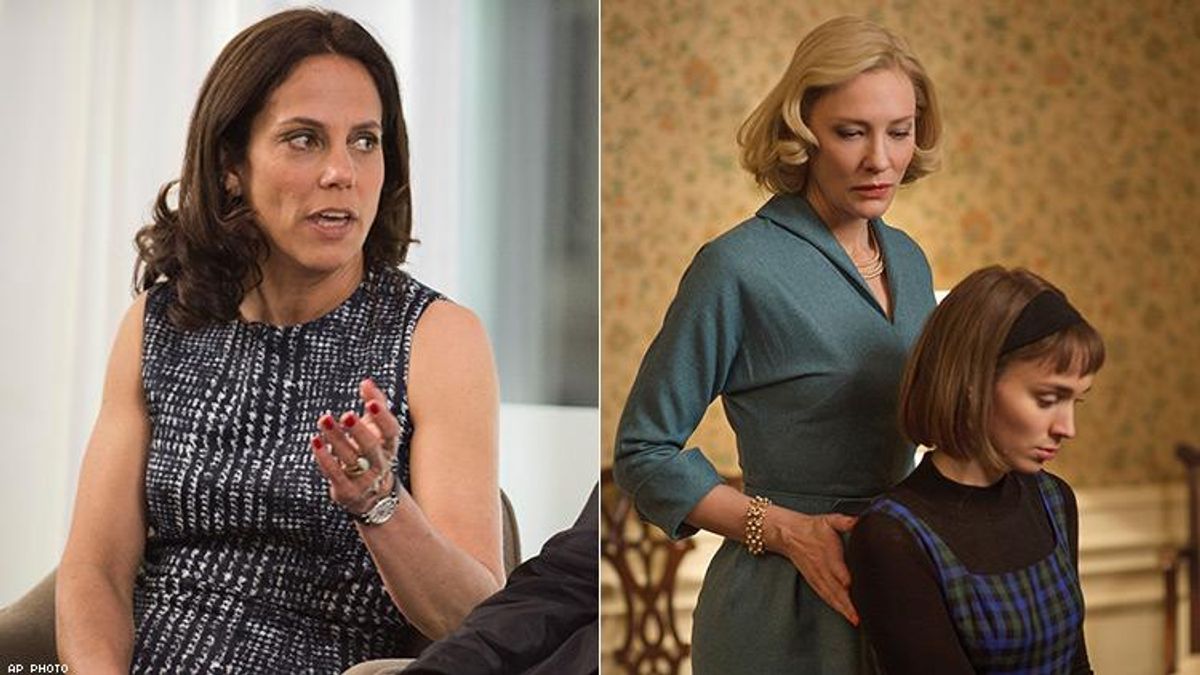The Cannes Film Festival has come and gone and despite the selection committee's failure to recognize a significant number of women in competition in a year in which women have demanded to be seen and heard, there were memorable moments of resistance. One such moment was when jury president Cate Blanchett led a silent protest against the dearth of female directors who've been recognized over the years. In a remarkable censure of the famed festival's male domination, Blanchett locked arms with 82 women -- the paltry number of women who've been in competition since the festival began in 1946 as opposed to more than 1,600 men -- including fellow jury members Kristen Stewart, Ava DuVernay, Khadja Nin, Lea Seydoux, and others including Agnes Varda, Jane Fonda, and Salma Hayek.
In an interview with Variety teasing her role as jury president before the festival began, Blanchett spoke openly about her disapproval of former Cannes's golden boy Harvey Weinstein's involvement with Carol, Todd Haynes's 2015 film about love between women for which she earned an Academy Award nomination.
"I was disappointed when he was brought on as a producer. I couldn't quite work out why. I said that at the time," Blanchett told Variety, adding that she didn't believe Weinstein properly backed and understood I'm Not There, another Haynes film in which she starred.
If Blanchett's open dismay with Weinstein's connection with the film weren't enough, Carol producer Elizabeth Karlsen, who shepherded the project to fruition over the course of more than a decade, wrote in the comments section of the Variety story that Weinstein had no role in producing the film or in its creative process. The Weinstein Company was the distributor of the film in the United States, she wrote, which she later confirmed with The Advocate.
But Karlsen, who's produced dozens of films including Mrs. Harris and The Crying Game (as co-producer), went even further in the comments in distancing the serial predator from the film.
"He [Weinstein] was not a producer on the film. Neither he nor TWC [The Weinstein Company] were involved in the development of the [Carol] nor had any script, editorial, casting, or other type of creative involvement in the film whatsoever," Karlsen wrote in the comments section of the Variety article.
It's not surprising that the news about Weinstein and Carol broke during Cannes. Not only was Blanchett leading the jury and therefore likely to be asked to weigh in on the #MeToo movement and predator Weinstein's involvement with films in which she starred. But the festival, which once welcomed Weinstein and power players like him with open arms, took the step of setting up a sexual harassment hotline during the festival, a move that came decades too late for some of Weinstein's sexual assault survivors. Karlsen told The Advocate a hotline wasn't enough -- that increasing women's visibility at high-profile festivals like Cannes was how things would change.
While Blanchett and Karlsen worked prior to the festival to distance Weinstein from his involvement with Carol, a touchstone film for so many queer women, actress Asia Argento took to the stage at Cannes -- where The Weinstein Company picked up the distribution rights to Carol -- to expose him and to implicate the festival for its role in setting up a space where sexual abuse was not out of the norm.
"In 1997, I was raped by Harvey Weinstein here at Cannes. I was 21 years old. The festival was his hunting ground," Argento said, with jury member DuVernay at her side. "And even tonight, sitting among you, there are those who still have to be held accountable for their conduct against women, for behavior that does not belong in this industry, does not belong in any industry or workplace. You know who you are, but most importantly -- we know who you are and we're not going to allow you to get away with it any longer."
The patriarchy is still "entrenched and endemic" in the film business and at Cannes, Karlsen told The Advocate prior to leaving for the event. She said she had concerns that so few women were in competition and that providing (primarily) women with a "hotline and an email" to report sexual harassment and abuse would not solve the gendered problems at the festival.
Regarding Weinstein's association with Carol, Karlsen said it's "frustrating when he's referred to as a producer," adding that she and screenwriter Phyllis Nagy had "nurtured" the project for years.
In her Variety comment, Karlsen's frustration was clear, and she let it be known in no uncertain terms that The Weinstein Company title card that appears before Carol's credits has no business being there.
"They [The Weinstein Company] acted solely as distributors. Had we had an offer equal to or greater than the TWC offer for U.S. distribution rights we would have taken it, but we didn't," Karlsen wrote. "This is a frequent and frustrating misrepresentation of Harvey Weinstein and his role -- he was a distributor who stole the producing credit (as well as the financial rewards) from the actual producers who sourced, developed, filmed and fully created the work as we did with Carol."
Karlsen may take some comfort in this fact: the New York Police Department may finally arrest Weinstein for his crimes against women.













































































